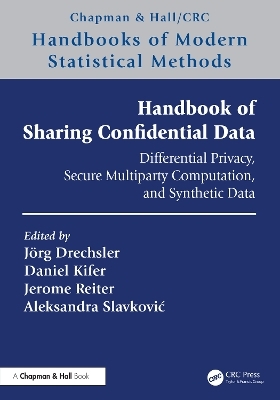
Handbook of Sharing Confidential Data
Chapman & Hall/CRC (Verlag)
978-1-032-02803-3 (ISBN)
Key features:
• Provides overviews of the potential and the limitations of synthetic data, differential privacy, and secure computation
• Offers an accessible review of methods for implementing differential privacy, both from methodological and practical perspectives
• Presents perspectives from both computer science and statistical science for addressing data confidentiality and privacy
• Describes genuine applications of synthetic data, formal privacy, and secure computation to help practitioners implement these approaches
The handbook is accessible to both researchers and practitioners who work with confidential data. It requires familiarity with basic concepts from probability and data analysis.
Jörg Drechsler is Head of the Department for Statistical Methods at the Institute for Employment Research in Nuremberg, Germany, and Professor of Statistical Science at the Institute for Statistics at the Ludwig-Maximilians-University in Munich. He is also Associate Research Professor in the Joint Program in Survey Methodology at the University of Maryland. His main research interests are data confidentiality and nonresponse in surveys. He is a fellow of the International Statistical Institute. He received his PhD in Social Science from the University of Bamberg and his Habilitation in Statistics from the Ludwig-Maximilians-Universität in Munich. Daniel Kifer is Professor of Computer Science at Penn State University. He has published extensively on technical approaches for privacy and confidentiality, with work spanning attack algorithms, novel methods for disclosure avoidance, statistical analysis of perturbed data, and automated tools for catching implementation errors. In 2016–2017, Kifer spent his sabbatical at the U.S. Census Bureau and helped design the disclosure avoidance system used for the 2020 Decennial Census. Kifer obtained his bachelor’s degrees in mathematics and computer science at New York University and his PhD at Cornell. Jerome Reiter is Professor of Statistical Science at Duke University. His primary research areas include methods for protecting data confidentiality, for handling missing values, and for integrating data across multiple sources. He has worked extensively on theory, methods, and applications for synthetic data. He is Fellow of the Institute of Mathematical Statistics and the American Statistical Association. He received a PhD in statistics from Harvard University and his undergraduate degree from Duke University. Aleksandra Slavkovic is Professor of Statistics & Public Health Sciences, Dorothy Foehr Huck and J.Lloyd Huck Chair in Data Privacy and Confidentiality, and Associate Dean for Research, Eberly College of Science at Penn State. Her research focuses on methodological developments in the area of data privacy and confidentiality in the context of small- and large-scale surveys, health, genomic, and network data, including work on differential privacy and broad data access that offers guarantees of accurate statistical inference needed to support reliable science and policy. She is Fellow of the American Statistical Association, the Institute of Mathematical Statistics, and the International Statistical Institute. She received her PhD (2004) and MS (2001) in statistics and Master of Human-Computer Interaction (1999) from Carnegie Mellon University. She received her BA in psychologyfrom Duquesne University (1996).
1. Introduction Part 1. The Big Picture 2. Protecting Confidential Data through Non-Statistical Methods 3. 21st Century Statistical Disclosure Limitation: Motivations and Challenges Part 2. Formal Privacy Techniques 4. Review of Popular Algorithms for Differential Privacy 5. Privacy Implications of Practical Model Design Choices 6. Query answering for tabular data 7. Machine learning with differential privacy 8. Statistical Inference and Differential Privacy 9. Systems Issues in Formally Private Systems Part 3. Synthetic Data 10. Synthetic Data 11. Methods for Synthetic Data Generation 12. Validation Services for Confidential Data Part 4. Secure Multiparty Computation 13. Privacy-Preserving Distributed Computation 14. Differential Privacy and Cryptography 15. Overview of Secure Multi-Party Computation Applications in Health Research and Social Sciences Part 5. Use Cases 16. Differential Privacy Implementations 17. Synthpop a tool to enable more flexible use of sensitive data within the Scottish Longitudinal Study 18. Safe Data Technologies: Safely Expanding Access to Administrative Tax Data 19. Secure Federated Learning: Integrated Statistical Modeling for Healthcare Applications
| Erscheinungsdatum | 07.09.2024 |
|---|---|
| Reihe/Serie | Chapman & Hall/CRC Handbooks of Modern Statistical Methods |
| Zusatzinfo | 10 Tables, black and white; 40 Line drawings, black and white; 40 Illustrations, black and white |
| Sprache | englisch |
| Maße | 178 x 254 mm |
| Gewicht | 789 g |
| Themenwelt | Informatik ► Netzwerke ► Sicherheit / Firewall |
| Mathematik / Informatik ► Mathematik | |
| ISBN-10 | 1-032-02803-3 / 1032028033 |
| ISBN-13 | 978-1-032-02803-3 / 9781032028033 |
| Zustand | Neuware |
| Haben Sie eine Frage zum Produkt? |
aus dem Bereich


